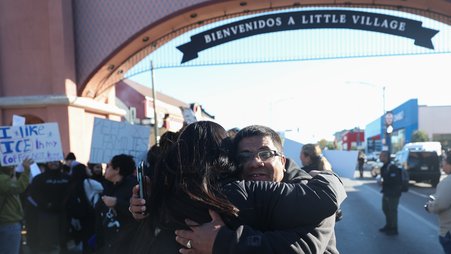
William Barr is Trump's nominee for Attorney General.
In recent days, several reports have painted an increasingly disturbing picture of Trump’s Justice Department (DOJ) and his pending Attorney General nominee. They should worry anyone who cares about press freedom.
While Trump insults journalists almost daily—and gets the lion’s share of attention from the media—his Justice Department’s potential moves may have a much more substantial effect on journalist’s rights. They should be getting the same, if not more, coverage than Trump’s tweets receive.
Earlier this week, Trump’s Attorney General nominee William Barr was asked in his Senate confirmation hearing whether he would consider “jailing journalists for doing their jobs.” While the incredibly easy answer would have been an immediate “no,” he instead demurred, and responded like this, according to the New York Times:
Mr. Barr paused before explaining that he could conceive of situations “as a last resort” where a news organization or journalist needs to be held accountable for “putting out stuff that they know will harm the country.”
This statement is much more dangerous than it may seem on the surface. For decades, the US government has accused journalists of “hurting the country” after basically every major national security story of significance. From reporting on CIA torture, to warrantless wiretapping, to drone strikes and more, it is the government’s go-to criticism when they are caught by the press doing something controversial in secret; Barr’s potential definition of “hurt the country” would ensnare countless journalists and it should be vigorously contested.
Within twenty four hours of Barr’s comments, The Hill reported on another worrying story coming from sources in the Justice Department: “For months now, the Department of Justice (DOJ) quietly has been working on a revision to its guidelines governing how, when and why prosecutors can obtain the records of journalists, particularly in leak cases.”
This has been a fear of many press freedom advocates for over a year, ever since former Attorney General Jeff Sessions vowed to revisit the DOJ’s strict internal guidelines for surveilling or subpoenaing of journalists in 2017. Sessions’ comments came as part of the DOJ’s ramping up of leak investigations—another threat to journalists’ rights. (Trump’s DOJ is on track to prosecute more leakers to the press than the Obama administration, which holds the current record).
According to The Hill’s John Solomon, Deputy Attorney General Rod Rosenstein—who has become somewhat of a media darling in recent years because of his conflicts with Trump—is leading the charge to loosen restrictions on going after journalists, with two specific goals: “The first is to lower the threshold that prosecutors must meet before requesting subpoenas for journalists’ records; the second is to eliminate the need to alert a media organization that Justice intends to issue a subpoena.”
While the current DOJ media guidelines—put in place by Obama Attorney General Eric Holder after several scandals involving spying on journalists—contain two worrying loopholes, they do provide significant protections from government overreach (if the Justice Department chooses to follow them).
Freedom of the Press Foundation, along with the Knight Institute for Columbia, has been suing DOJ under the Freedom of Information Act for more than a year now for more information about how the DOJ conducts surveillance of journalists under the Trump administration. These types of rule changes are exactly the type of information we have been seeking, and we look forward to seeing how this story may affect our case.
In addition, it’s been public knowledge for months now that the Justice Department also has filed secret charges against WikiLeaks founder Julian Assange, which could potentially have serious ramifications for all journalists. The DOJ has so far refused to unseal the charges, but as we have stated previously: regardless of your feelings on Assange, these charges could have a profound effect on press freedom rights.
All of this comes on the heels of the FBI arresting a broadcaster for Iranian state television (and American citizen) Marzieh Hashemi under mysterious circumstances earlier this week. The Associated Press has reported that Hashemi was apparently arrested because she is to be a witness at a grand jury hearing next week and they feared she would flea. However, the Justice Department has released zero evidence showing this is true, and they have refused to confirm if the arrest has anything to do with her journalistic work.
The fact that Hashemi works for a state run media outlet should not curtail her press freedom protections. In addition to potentially violating Hashemi’s own rights, such a move could lead to dangerous retaliation or copycat cases in authoritarian countries abroad. Until the Justice Department publishes legitimate evidence to the contrary, we strongly condemn the move and call on the authorities to release her.
All of these cases present a troubling trend: the Justice Department is increasingly considering taking serious action against members of the media, and it’s an ominous warning to journalists that all of our rights may be in increased danger.




